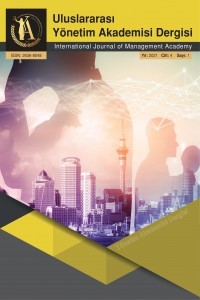Kamu Kurumlarında İnsan Kaynakları Yönetimi ve Teknoloji: Gelecek Odaklı Bir Değerlendirme
İnsan Kaynakları Yönetimi, Teknoloji, Kamu Kurumları, Özel Sektör
Human Resources Management and Technology in Public Institutions: A Future-Oriented Assessment
___
- AGARWAL, Ritu ve FERRATT, Thomas W. (1999), “Crafting an HR Strategy to Meet the Need For IT Workers”, Communications of the ACM, S.44(7), ss.58-64.
- ANDER, Stephen (2009), From Brain Drain to Brain Gain: Fixing U.S. Government College Recruitment, Partnership for Public Service, U.S.A.
- BARMAN, Arup ve AHMED, Hussain (2015), “Big Data in Human Resource Management - Developing Research Context”, E-Title, https://www.researchgate.net/publication/275520745_Big_Data_in_Human_Resource_Management_-_Developing_Research_Context (Erişim Tarihi: 28.05.2018).
- BAYAT, Bülent (2008), “İnsan Kaynakları Yönetiminin Stratejik Niteliği”, Gazi Üniversitesi İktisadi ve İdari Bilimler Fakültesi Dergisi, S.10(3), ss.67-91.
- BERSİN, Josh (2013), “Big Data in Human Resources: Talent Analytics (People Analytics) Comes of Age”, E- Haber, https://www.forbes.com/sites/joshbersin/2013/02/17/bigdata-in-human-resources-talent-analytics-comes-of-age/#52d1bd14cd03 (Erişim Tarihi: 28.05.2018).
- BIRO, Meghan (2017), “Data Security Must Be a Top Priority for HR”, E-Haber, https://www.huffingtonpost.com/meghan-m-biro-/data-security-must-be-a-t_b_10932396.html (Erişim Tarihi: 27.05.2018).
- BOYD, Danah ve CRAWFORD, Kate (2012), “Critical Questions For Big Data: Provocations For a Cultural, Technological and Scholarly Phenomenon”, Information, Communication & Society S.15(5), ss.662–679.
- BULMASH, Julie (2006), “Human Resources Management and Technology”, https://catalogue.pearsoned.ca/assets/hip/us/hip_us_pearsonhighered/samplechapter/0132270870.pdf (Erişim Tarihi: 26.05.2018).”
- CASTELLS, Manuel (1999), Critical Education in The New Information Age, Rowman & Littlefield, Maryland.
- CRONIN, Brian , MORATH, Ray, CURTIN, Pat ve HEIL, Michael (2006), “Public Sector Use of Technology in Managing Human Resources”, Human Resource Management Review, S.(16), ss.416–430.
- DALY, John L. (2012), Human Resource Management in the Public Sector, Routledge, New York.
- DESSLER, Gary (2005), Human Resource Management, Prentice Hall, New Jersey, 10. Baskı.
- GÖÇOĞLU, Volkan (2014), “Kamu Politikası ve Sosyal Medya İlişkisi”, Yüksek Lisans Tezi, Hacettepe Üniversitesi Sosyal Bilimler Enstitüsü, Ankara.
- GÖÇOĞLU, Volkan (2018), “Türkiye’nin Siber Güvenlik Politikalarının Kamu Politikası Analizi Çerçevesinde Değerlendirilmesi”, Doktora Tezi, Hacettepe Üniversitesi, Ankara.
- GÖÇOĞLU, Volkan, TURNA, Alper ve ÖKTEM, Mustafa Kemal (2016), “Türkiye’de Bilimsel Toplantıların Organize Edilmesi: TÜBİTAK Üzerine Bir Örgüt Geliştirme Önerisi”, Siyaset, Ekonomi ve Yönetim Araştırmaları Dergisi, S.4(1), ss.1-31.
- HEINTZE, Theresa ve BRETSCHEİNDER, Stuart (2000), “Information Technology and Restructuring in Public Organizations: Does Adoption of Information Technology Affect Organizational Structures, Communications and Decision Making”, Journal of Public Administration Research & Theory, S.10(4), ss.778-812.
- HODOR, Elena Sabrina (2016), “The Impact Of Technological Changes On Human Resource Management”, http://www.upm.ro/gidni3/GIDNI-03/Soc/Soc%2003%2021.pdf (Erişim Tarihi: 26.05.2018).
- ITIKA, Josephat Stephen (2011), Fundamentals of Human Resources Management, African Studies Center, Hollanda.
- JAİN, Sweta (2017), “Is Artificial Intelligence The Next Big Thing In Hr?”, International Conference on Innovative Research in Science, Technology and Management.
- KÖROĞLU, Özlem Taner (2010), “Türkiye’de Personel Yönetiminden İnsan Kaynaklarına Geçişte Esneklik ve Memur Statüsü”, Türk İdare Dergisi, S.469, ss.139-164.
- LEBLEBİCİ, Doğan Nadi (1996), “Çağdaş Kamu Yönetiminde Enformasyon Teknolojisinin Yeri ve Enformasyon Sistemleri”, Doktora Tezi, Hacettepe Üniversitesi Sosyal Bilimler Enstitüsü.
- LONG, Yu (2009), “The Impact Of Information Technology on the HR Function Transformation”, Yüksek Lisans Tezi, University of Twente, Hollanda.
- MALHOTRA, Meenakshi (2017), “Digital Transformation in HR”, International Journal of Interdisciplinary and Multidisciplinary Studies, S.4(3), ss.536-544.
- MURPHY, Marian (2002), Organisational Change and Firm Performance, OECD Publishing, Fransa.
- OSBORNE, David ve GAEBLER, Ted (1992), Reinventing Government: How the Entrepreneurial Spirit is Transforming the Public Sector, Addison-Westley, Massachusettes.
- PIRY, Abedin, HATAMIKHIBARI, Hameidreza, JANFESHAN, Kamran ve GHAHRAMANI, Masomeh (2013), “The Role of Information Technology in Human Resource Management”, Journal of Basic and Applied Scientific Research, S.3(1), ss.1034-1038.
- PWC (t.y.), “Artificial Intelligence in HR: a No-brainer”, https://www.pwc.at/de/publikationen/verschiedenes/artificial-intelligence-in-hr-a-no-brainer.pdf (Erişim Tarihi: 27.05.2018).
- SADULLAH ,Ömer (1998), “İnsan Kaynakları Yönetimi Açısından Bir Yönetim Yaklaşımı Olarak Toplam Kalite Yönetiminin Kamu Organizasyonlarına Uygulanabilirliği”, İstanbul Üniversitesi İşletme Fakültesi Dergisi, S.27, ss.35-48.
- SCHROECK, Michael, SHOCKLEY, Rebecca, SMART, Janet, ROMERO-MORALES, Dolores ve TUFANO, Peter (2012), Analytics: The Real-World Use of Big Data. IBM Global Business Services, ss.1–20.
- SEÇER, Şebnem ve ÖZGÜR, Ayşenur (2017), “İnsan Kaynakları Yönetimi Alanında Bilgi ve İletişim Teknolojileri Kullanımı: İnsan Kaynakları Yöneticileri ile Nitel Bir Araştırma”, International Journal of Economic and Administrative Studies, 16. UİK Özel Sayısı, ss.149-166.
- SÖZER, Burcu Özçelik (2017), “İK'nın Geleceği Büyük Veride”, E-Haber, http://www.hurriyet.com.tr/ik-yeni-ekonomi/iknin-gelecegi-buyuk-veride-40423034 (Erişim Tarihi: 28.05.2018).
- STEWART, Thomas (1991), “Brainpower”, Fortune, S.123(11), ss.44-60.
- STEWART, Thomas (1997), Entelektüel Sermaye (Çev.Nurettin Elhüseyni), Mess Yayınları, İstanbul.
- STOREY, John (1995), “Human Resource Management: Still Marching on, Or Marching Out?”, Human Resource Management: A Critical Text (Ed. John Storey), Routledge, London, ss.3-32.
- TANSLEY, Carole ve WATSON, Tony. (2000), “Strategic Exchange in the Development Of Human Resource Information Systems (HRIS)”, New Technology, Work and Employment, S.15(2), ss.108-122.
- ULRICH, Dave ve BROCKBANK, Wayne (2005), The HR Value Proposition, Harvard Business Press, Boston.
- WALKER, Alfred J. (1982), HRIS Development, Van Nostrand Reinhold, New York.
- WEBSTER, Frank (2006), Theories Of The Information Society, Routledge, UK.
- YALTI, Burcu (2006), “Bilgi Teknolojilerinin İnsan Kaynakları Yönetim Süreçlerinden İşe Alma ve Eğitim Üzerine Etkileri: e-Aday Toplama ve e-Öğrenme”, Yüksek Lisans Tezi, Dokuz Eylül Üniversitesi Sosyal Bilimler Enstitüsü, İzmir.
- ISSN: 2636-8048
- Başlangıç: 2018
- Yayıncı: Mehmet MECEK
Suç Korkusu, Göç ve Suriyeli Sığınmacılar: Şanlıurfa Örneği
Lizbon Stratejisi ve Avrupa 2020 Hedeflerinde Bölgesel Kalkınma ve Sosyal Politikalar
Pazarlama Muhasebesi ve Müşteri Kârlılık Yönetimine Yönelik Genel Bir Değerlendirme
Ülkelerin Markalaşma Süreci ve Marka Kavramı
Hüsamettin İNAÇ, İbrahim YACAN
Marka Şehir Kavramı ve Türkiye ile Dünyadaki Marka Şehir Çalışmaları Üzerine Bir Araştırma
İstanbul İlçe Belediyelerinin Dış İlişkileri
Ömer Faruk GENÇKAYA, Kemal KAYA
Kent Konseylerinde Kadın Eli: Söke Kent Konseyi Kadın Meclisi Üzerinden Bir Değerlendirme
